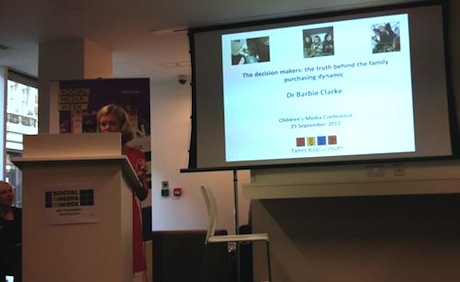
Tuesday morning at the Sport, Entertainment & Culture Hub at Engine saw The Decision Makers: The Truth Behind the Family Purchase Dynamic, hosted by DOCO London. Catch up with the Livestream below.
Families in the UK spend around £187B a year yet not much is known about the complicated decision making dynamic that goes into how that money is spent. This session looked at who in the family makes what decisions and how the members of the family influence each other and what role social media plays in inter-family communications and the decision making process.
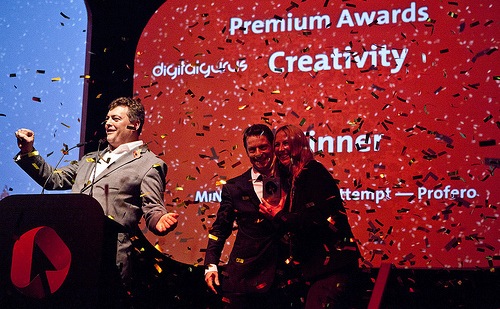
The British Interactive Media Association (BIMA) have announced the shortlist for the 2012 BIMA Awards, hailing it as the most diverse agency spread in recent years.
Finalists for the 27th annual awards included Heinz for Get Well Soup, Skype for Say it with Skype, the Kaiser Chiefs bespoke album creation experience, BBC Sport’s website relaunch, Nike Academy, Pottermore, M&S for Pass the Parcel, and Microsoft for Brandon Generator.
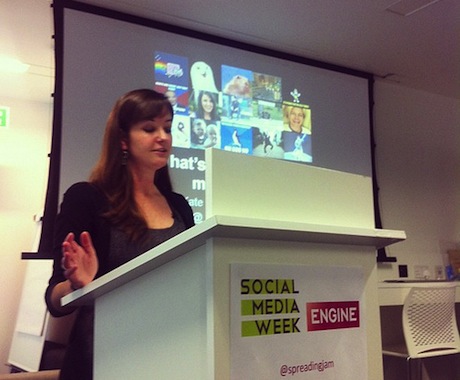
What's Happening to the Memesphere, hosted by Jam's Kate Miltner (@katemiltner) took place on Monday 24th September at the Sport, Entertainment & Culture Hub at Engine. Catch up with the livestream below.
Memes used to be the province of an internet subculture based around sites and forums like 4chan and Something Awful. But over the past few years, memes have gone from “inside jokes your friends don’t get” to a key element of cultural discourse and a part of the mainstream news cycle. During the session, Kate Miltner discussed how the memesphere has evolved, where it might be going and what these changes mean for the online cultural landscape.

We're delighted to announce the line-up for what promises to be an insightful panel at this Wed's Chinwag Live: Webs of Influence event.
The panel spans the worlds of psychology, neuroscience and behavioural economics and there'll be plenty of time for audience Q&A, featuring Sarah Wood, Co-Founder of award-winning social video platform Unruly, Dawn Smith from Digitaria, the driving force behind KONY 2012's viral campaign, Jon Murphy from Oban Multilingual an expert in country-specific SEO and cultural insight and Rob Tezska, Cognitive Pyschologist and Science of Magic PhD student.
The debate is chaired by Nathalie Nahai, The Web Psychologist and author of Webs of Influence: The Psychology of Online Persuasion. Nathalie will kick off the session with a whistlestop tour of some of the highlights from her book.
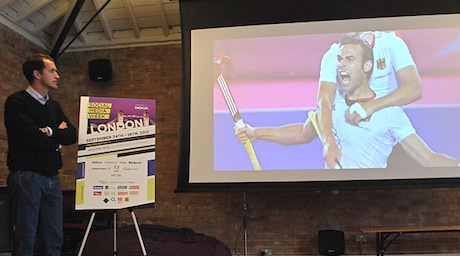
This year was not only the year of the Queen's Jubilee, the Olympics and the Paralympics, but also the only year that Social Media Week London will take place twice within 12 months (therefore, needless to say, there will not be a SMWLDN in February).
Our second Social Media Week London this year has now passed, having moved to it's new home of September, and what a week 24th - 28th September 2012 was.
This September's SMWLDN saw 176 events taking place across the city, with 21 of those being Chinwag events - and all the rest thanks to our 125 wonderful event partners including BBC, Beyond, CIPR, Dachis Group, Dell, McKinsey & Company, Eventbrite, Great British Chefs, Hootsuite, London College of Fashion, Microsoft, Nursing & Midwifery Council, Royal Television Society, Story Worldwide, Skype, Unilever, Yammer and more.
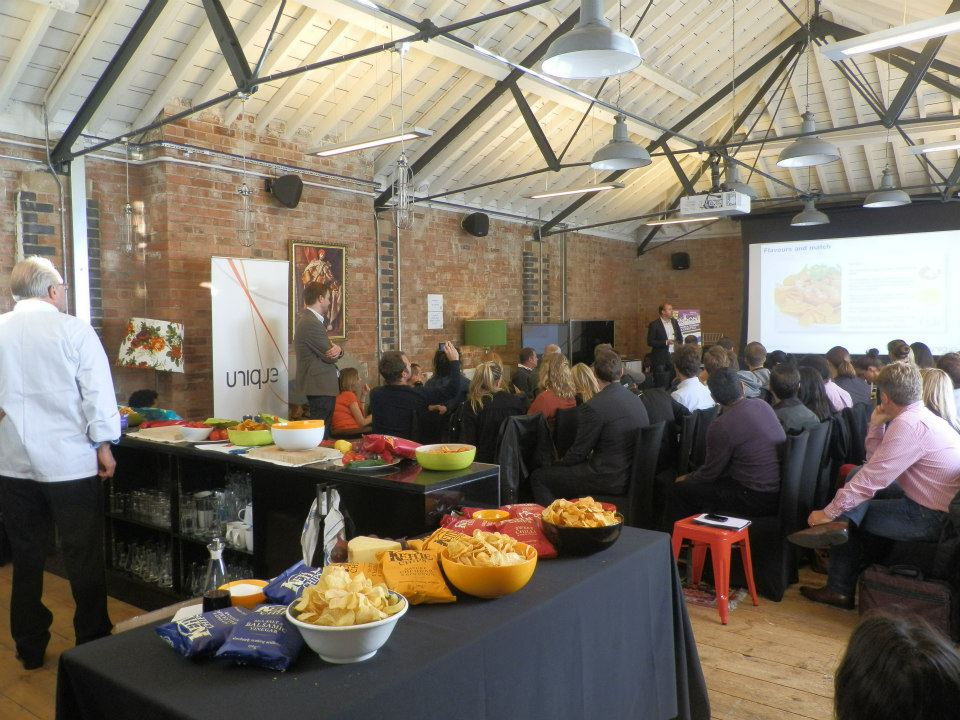
This is a Guest Blog Post by Unique Digital.
On the 27th of September, Unique Digital showcased the new KETTLE® Chips social media campaign live at Social Media Week London.
'Chopped, Diced and Sliced' mirrored what is happening within KETTLE® Chips online social environment at an offline event, showcasing a 360 degree view of the planning, strategy, process and implementation of the new social campaign.
The first half of the event covered KETTLE® Chips social brief, new product launch and objectives giving you a taste of the entire process from the initial concept. This was followed by Unique Digital's creative response, media planning and new innovations within social media.

In the boring old real ‘analogue’ world, ideas of authorship and authority naturally sit together. Over time we work out who is talking sense and who is full of hot air.
While I can work on simple hypotheses like ‘if this is written by Melanie Phillips it is almost certainly ghastly rubbish’, a search engine like Google has to calculate authority through a dense mix of keyword density, social cues, link quality, time on page, speed of hitting the back button, etc, etc.
That’s hard work - which is why Google is now starting to account for authorship in its algorithm. It is identifying content by author, and is starting to calculate the authority of different authors. So all things being equal, if Delia Smith and Jamie Oliver are both writing about breakfast, the author with the highest authority will rank higher and (cue drumroll) bring home the bacon.
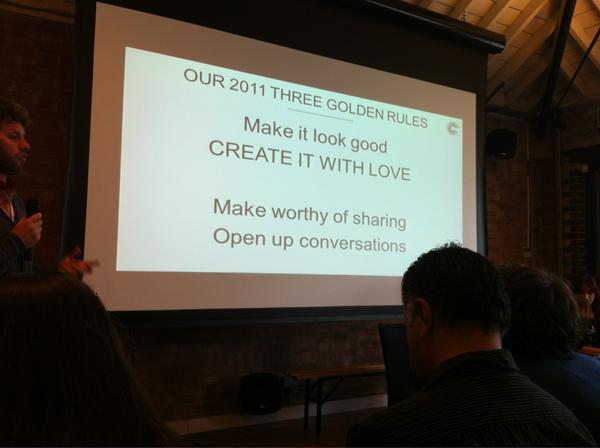
This is a guestblog by Beckie Stravers / Social Media Week.
Ollie Lloyd of @gbchefs started off the discussion on the social business of food driving home the basic 3 rules of social strategy. Make it look good, make it worthy of sharing, and start a conversation! With special emphasis on the “looking good” part. Spend money on great design, there is no place for average images in the social medium. However, remember that a good food image (or any image for that matter) is created with love. Not food stylists.
Great British Chefs also emphasised dedicating time and experimenting in trendy or fridge social efforts, but be prepared to fail. GBChefs saw an oppotunity with Google+ to host live cooking demonstrations paired with G+ hangouts. This risk ended up paying off as GBChefs outlines greater follower numbers on G+ than Facebook. Though their Facebook insights are nothing to sneeze at, quoting an average of 400 engagements per post 3-4 times per day.
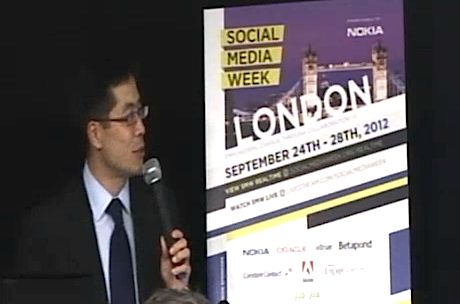
Want to know what holds the key to global enterprises unlocking up to £800million in economic value on a yearly basis?
Social technologies have been the fastest adopted form of media in human history, and according to McKinsey Global Institutes (MGI) recent report “The Social Economy: Unlocking Value and Productivity through Social Technologies" we're still only at the beginning of what the potential impact of these technologies could be. Two-thirds of this potential £800million lies within the need to improve collaboration and communication within and across enterprises. Social technologies are no longer merely a 'new media platform', but an increasingly necessary business tool.
MGI’s findings suggest that by fully implementing social technologies, companies have an opportunity to raise the productivity of interaction workers - high-skill knowledge workers, including managers and professionals - by 20-25%!
Two-thirds of this potential value lies in improving collaboration and communication within and across enterprises.

This is a guest blog by Joyce Sullivan / Social Media Week.
I hear the weather was dreadful in London on Monday morning but the talks and conversations sparkled at Using Social To Go Global Supported by Open to Export.
The session kicked off with Sam Michel of Chinwag aka @toodlepip welcoming all with a ‘meet your neighbour’ greet.
Philip Montague @PhilSMEin of hibu kicked off the morning talks by first sharing a boyhood memory how he confidently jumped off the back of his grandfather’s sailboat to swim to secure the dinghy line that came undone. Though confident he could make the journey on his own, he realised he needed help to get back to the boat. Lesson learned: as confident as you may be, you may need some help with your journey. Philip’s intro framed the mission for Open to Export how they help UK businesses navigate their product export potential.
















